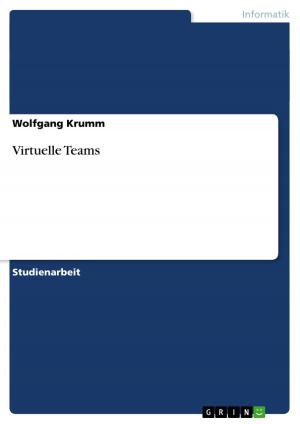Margaret Oliphant 'Miss Marjoribanks' - The protagonist`s search for her position in society
Fiction & Literature, Literary Theory & Criticism, British| Author: | Swantje We | ISBN: | 9783640902163 |
| Publisher: | GRIN Verlag | Publication: | April 28, 2011 |
| Imprint: | GRIN Verlag | Language: | English |
| Author: | Swantje We |
| ISBN: | 9783640902163 |
| Publisher: | GRIN Verlag |
| Publication: | April 28, 2011 |
| Imprint: | GRIN Verlag |
| Language: | English |
Seminar paper from the year 2010 in the subject English Language and Literature Studies - Literature, grade: 1, University of Vechta (Intitut für Geistes- und Kulturwissenschaften), course: Gender Relations in 20th Century Fiction, language: English, abstract: '(...) in such a case as hers, it was evidently the duty of an only child to devote herself to her father's comfort, and become the sunshine of his life' (Oliphant, 4). Margaret Oliphant published almost a hundred novels and with 'Miss Marjoribanks' she created a masterpiece. The novel is about a young woman who tries to overcome the social boundaries of the Victorian era. The protagonist claims to act for her father's comfort but in some cases it is doubtful whether Miss Marjoribanks really 'devotes herself to her father' (Oliphant, 4). It rather seems that she hides herself in the image of the caring daughter in order to protract other goals. This paper deals with the topic 'Miss Marjoribanks: A Woman's Search for her Position in Society' and will reveal some of Lucilla's calculating actions. Since there are two papers on the topic I will confine myself to lining out Lucilla's aims, the steps of emancipation and I will compare Lucilla to Charlotte Brontë's 'Jane Eyre'. 2. Lucilla's Aims Throughout the novel, the protagonist Lucilla Marjoribanks undergoes certain developmental stages and faces various challenges that define her social status and position. Inferior to men by Victorian world order, Lucilla tries to overcome social boundaries and challenges social order. In this case, she undertakes different campaigns in order to discard the typical role of a woman in the Nineteenth century. She wants to expand her sphere which is limited to domestic arrangements according to the Victorian image of a woman. Beyond that she contrives to change not only her own situation but to reorganise society and refute stereotypical thinking. In order to realise this campaign, she aims to take on the role of the leading actor in Carlingford.
Seminar paper from the year 2010 in the subject English Language and Literature Studies - Literature, grade: 1, University of Vechta (Intitut für Geistes- und Kulturwissenschaften), course: Gender Relations in 20th Century Fiction, language: English, abstract: '(...) in such a case as hers, it was evidently the duty of an only child to devote herself to her father's comfort, and become the sunshine of his life' (Oliphant, 4). Margaret Oliphant published almost a hundred novels and with 'Miss Marjoribanks' she created a masterpiece. The novel is about a young woman who tries to overcome the social boundaries of the Victorian era. The protagonist claims to act for her father's comfort but in some cases it is doubtful whether Miss Marjoribanks really 'devotes herself to her father' (Oliphant, 4). It rather seems that she hides herself in the image of the caring daughter in order to protract other goals. This paper deals with the topic 'Miss Marjoribanks: A Woman's Search for her Position in Society' and will reveal some of Lucilla's calculating actions. Since there are two papers on the topic I will confine myself to lining out Lucilla's aims, the steps of emancipation and I will compare Lucilla to Charlotte Brontë's 'Jane Eyre'. 2. Lucilla's Aims Throughout the novel, the protagonist Lucilla Marjoribanks undergoes certain developmental stages and faces various challenges that define her social status and position. Inferior to men by Victorian world order, Lucilla tries to overcome social boundaries and challenges social order. In this case, she undertakes different campaigns in order to discard the typical role of a woman in the Nineteenth century. She wants to expand her sphere which is limited to domestic arrangements according to the Victorian image of a woman. Beyond that she contrives to change not only her own situation but to reorganise society and refute stereotypical thinking. In order to realise this campaign, she aims to take on the role of the leading actor in Carlingford.















